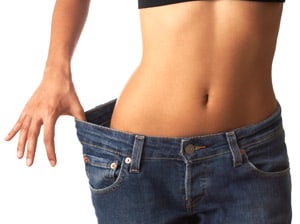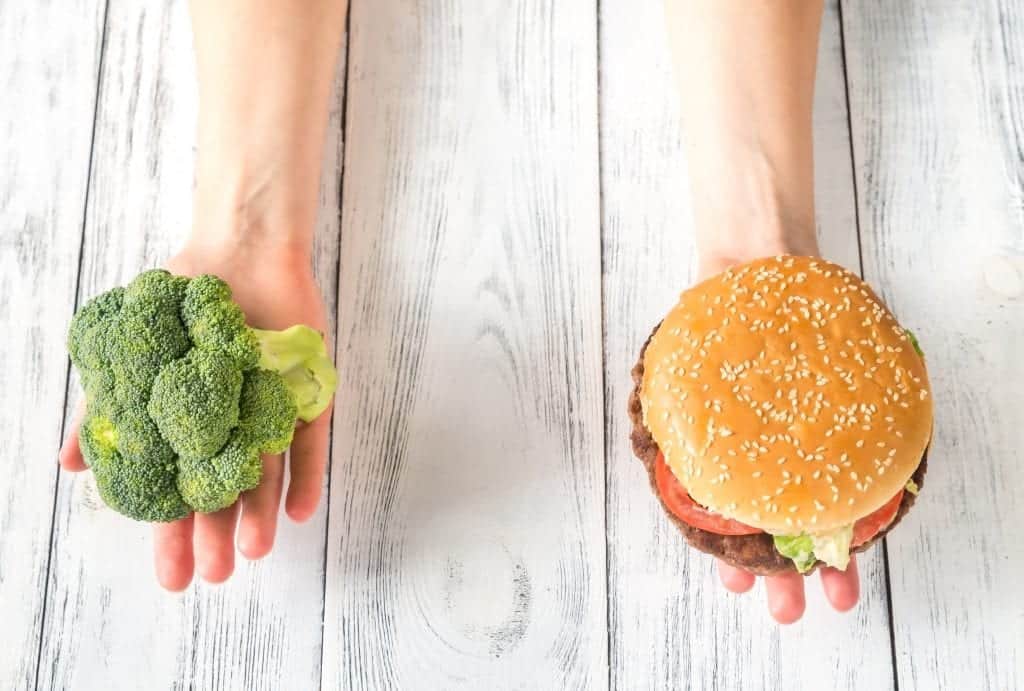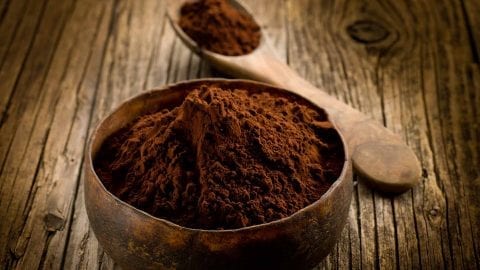If you’d asked me a decade ago what was the best method of weight loss was if I could choose only exercise or diet, I would have said exercise all day. That is, increase exercise, lean body mass, and so forth, to create a caloric deficit vs reducing calories if I could only choose one of those two approaches. That conclusion appears to have been wrong, and I’m here to explain why. On the surface, that conclusion turns a sacred cow of the fitness world on its head, but in retrospect, I think we knew it all along. Hey, someone said “you can’t out exercise a bad diet” and that’s essentially true. Who ever said it, just didn’t realize just how true it is.
We all know those people who are consistent in the gym and actually do work hard at it, yet look essentially the same year after year in terms of their bodyfat levels, and it’s not until they really get their act together on the nutritional side, do they see real changes in body composition. End of the day, exercise, regardless of type, is just not as important as once thought it was for weight loss. Will some use that as an excuse not to exercise? Sadly, yes. But those types are usually looking for excuses not to exercise anyway, so they’re not going to change in that respect. The rest of us realize regular exercise has so many benefits to general health, well-being, disease prevention, cardio vascular health, mood, anti-aging, how we look, and so forth, this news really changes nothing for us.

Like it or not however, exercise, regardless of the type, is just not a major contributor to weight loss. Understandably, many in the fitness community have rejected that idea (I was one of them until the data became simply overwhelming) as it causes some cognitive dissonance* in them, and or other reasons to reject it, such as a a perceived loss of revenue perhaps.
“Exercise is not a major contributor to weight loss? Madness!” they will say.
Unfortunately, that’s the fact of the matter, and whether I/we like it, science don’t care… Bottom line: A reduction in calorie via dietary changes is far more effective for weight loss then any attempts to increase either volume or intensity of exercise to lose weight. Obviously, the combination of both – dietary changes and exercise – is going to be the most effective, but the exercise component contributes much less to that caloric deficit than we thought. Yet again, the human body is able to outsmart us as it relates to efficiently dealing with total energy flux. In a nut shell, exercise itself does not use as many calories as we thought, added muscle mass does not require as many calories as we thought to sustain itself (approx. 6-9 cals per lb of LBM), and the post workout calorie expenditure (via EPOC), you guessed it, does not contribute a great deal to energy expenditure. All of them combined contributes to TDEE, but it’s not nearly as substantial as was assumed. I know, some will view that as an attack on exercise by scrawny researchers and aerobic weenies, and dad bod lovers, but it’s not. The fact is It’s actually difficult to create a sustained calorie deficit by exercise alone to see meaningful weight loss in the form of bodyfat, unless you’re running marathons regularly, or involved in Iron Man competitions and such, and the reality is, that’s not sustainable long term, the effect does plateau, which I will discuss shortly.
I’m not going to throw a bunch of numbers out regarding the above, as they continue to be something of a moving target, but the general conclusion is the same and well supported by a multitude of different directions; the major variable we all thought was the “key” to weight loss at it related to exercise, as outlined above, don’t contribute all that much to our total daily energy expenditure (TDEE) we’d all thought. Not only that, tangentially, “…the pervasive dieting mantra that a cumulative reduction of caloric intake of 3,500 will result in a weight loss of 1 pound of body weight” has been challenged, as covered by science writer Monica M HERE, but that’s another topic. There’s been other overly simplistic conclusions recently challenged, such as the way humans even utilize their calories compared to other animals, even our closest relatives. There’s been a long held consensus that mammals will have similar metabolic rates when adjusted for body mass. However, even among our closest relatives (the great apes) humans are outliers to that model . Humans “burn” 20% more energy per day than chimps and bonobos, 40% more than gorillas, and 60% more than orangutans, when adjusted for body mass. That’s not a small difference!
Humans are quite unique in other differences in our metabolisms – likely due mostly as a result of our large energy hungry brains – and a ground breaking article recently published in Science entitled How Evolutionary anthropologist Herman Pontzer busts myths about how humans burn calories—and why, is a must read article on the topic that further supports what I discuss in this post.

Amazingly, some studies find exercise may actually undermine weight loss in some, as they tend to simply eat more, often due to the effects of exercise on appetite as well as assuming they “burned” far more calories than they actually did during their workout and other factors, some subtle, some not. For example, studies find some people actually move less via NEAT (non-exercise activity thermogenesis or non-exercise activity energy expenditure) during the day once they start exercising regularly, partially or fully offsetting the calories used during their workouts. That’s not an excuse to not exercise while attempting to lose some bodyfat, but it’s a reason why one must pay strict attention to the nutritional aspect of their efforts to see real results in bodyfat. If you think about it, it does make intuitive sense, even if the reality that exercise is not all it was cracked up to be as it applies to weight loss will come as a shock to so many. OK, take a breath and think about it for a few minutes. While exercise is not a great weight loss drug, I think obesity researcher, Yoni Freedhoff summarized it well in an article via VOX magazine:

“By preventing cancers, improving blood pressure, cholesterol and sugar, bolstering sleep, attention, energy and mood, and doing so much more, exercise has indisputably proven itself to be the world’s best drug – better than any pharmaceutical product any physician could ever prescribe. Sadly though, exercise is not a weight loss drug, and so long as we continue to push exercise primarily (and sadly sometimes exclusively) in the name of preventing or treating adult or childhood obesity, we’ll also continue to short-change the public about the genuinely incredible health benefits of exercise, and simultaneously misinform them about the realities of long term weight management.”
Enter The Constrained Total Energy Expenditure hypothesis
The human body is incredibly adaptable to differences in energy and energy output, and the total energy expenditure (TEE) not a wide as people might think between say couch potatoes and those digging ditches all day or running marathons and such. In fact, those who exercise regularly do not have a markedly different TEE then those who do not, leading researchers to conclude the human body actively modulates metabolism to adjust to energy flux from increased or decreased activity levels and or caloric intakes. Most people will assume “more is better” when it comes to exercise and “burning” calories, but it appears the human body actually keeps a fairly tight control of that by various mechanisms, some not yet fully elucidated. (1) That is, the body “constrains” how many calories are used via metabolic adaptations and more does not appear to actually be better as far as exercise is concerned. For those who want to get into the details, I highly recommend reading the full report Constrained Total Energy Expenditure and Metabolic Adaptation to Physical Activity in Adult Humans in Volume 26, Issue 3, 8 February 2016, Pages 410-417 of Journal home page for Current Biology. A less dense discussion of that study and related matters, is “Constrained Energy Expenditures and Not Outrunning Our Forks” and “Why you won’t lose weight with exercise alone” as two excellent reads.
Conclusion
There’s a lot under the hood in this discussion and plenty of confounding variables to all this, but the take home is pretty straight forward: exercise is not a major factor to weight loss that many assumed in decades past, the human body proves itself to be far more adaptable to maintaining homeostasis than we realized, and when it comes to weight loss, “you can’t out exercise a bad diet” to paraphrase who ever said that originally. If weight loss is the goal, the major focus should be on creating the caloric deficit by nutrition, with exercise perhaps adding and additional 10% to that deficit, and good things will happen.
Finally, you still have to exercise for all the reasons covered above, and thus, it’s moot as to whether these findings actually change anything for health conscious individuals. A decade ago I would have said weight loss without regular exercise is going to result in failure to lose weight. While exercise will assist to be sure – as every little bit helps – it’s not the weight loss panacea once assumed. Hey, don’t kill the messenger. Now get in the gym and healthy up!
- (1) Exercise: Is More Always Better? Journal home page for Current Biology.Volume 26, Issue 3, 8 February 2016, Pages R102-R104
Will Brink is the owner of the Brinkzone Blog. Will has over 30 years experience as a respected author, columnist and consultant, to the supplement, fitness, bodybuilding, and weight loss industry and has been extensively published. Will graduated from Harvard University with a concentration in the natural sciences, and is a consultant to major supplement, dairy, and pharmaceutical companies.
His often ground breaking articles can be found in publications such as Lets Live, Muscle Media 2000, MuscleMag International, The Life Extension Magazine, Muscle n Fitness, Inside Karate, Exercise For Men Only, Body International, Power, Oxygen, Penthouse, Women’s World and The Townsend Letter For Doctors.
He’s also been published in peer reviewed journals.
Will is the author of the popular e-books, both accompanied by private members forum access , Bodybuilding Revealed & Fat Loss Revealed.
You can also buy Will’s other books on Amazon, Apple iBook, and Barnes and Noble.








“Will some use that as an excuse not to exercise? Sadly, yes. But those types are usually looking for excuses not to exercise anyway, so they’re not going to change in that respect. The rest of us realize regular exercise has so many benefits”
this quote should be reversed. the vast majority of the populous fall into “those types”, “the rest of us” is a small subculture of gym rats (like will brink ). 90% of people hate going to the gym but go anyway.
It’s a good point! Even when we consider how long it takes for a 220 lbs (100 kg) person exercising at their maximal oxygen consumption (VO2 max) to burn 500 kcal. Assuming an average VO2 of 40 mL/min/kg, they would have to exercise at their max heart rate for around 25 min. Elite runners can only maintain their VO2 max for ≈12 min. So, it’s going to take many people closer to an hour of cardio to burn that amount of kcal. Then you have the overfeeding phenomena “rewarding” oneself for working hard, as well as chronic adaptations of possibly losing muscle mass from frequent long cardio without resistance exercise (due to lack of time). Thanks for sharing this post!
Kellogg’s and Nestle hate you.
The first line of argument they feed to their customers is “walk and do some kind of exercise everyday and eat my products”
I use TDEE to manage my body composition and my Lange Skinfold caliper using the three site skinfold (Jackson & Pollock) formula.
The majority of advertising for exercise equipment is so misleading.
Thanks for the references to the articles.